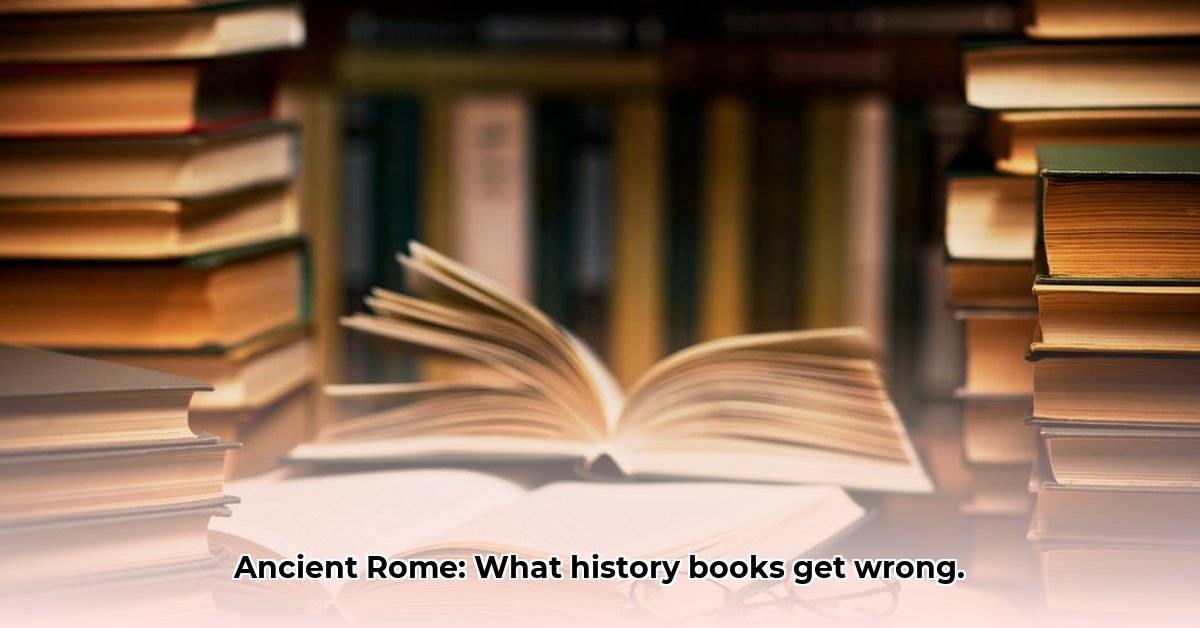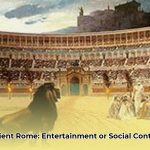Ever wondered what life was truly like in Ancient Rome, beyond the captivating movies and enduring legends? This guide serves as your essential resource to the finest books that peel back the layers, revealing the authentic stories of emperors, everyday citizens, and the complex societal fabric in between. Want even more curated recommendations? Explore more here. Forget the dry textbooks of old – we’re diving into compelling reads that unequivocally bring Roman history to life, from epic tales of power and dramatic downfall to the intricate details of Roman culture. Prepare to explore profound questions, uncover fresh perspectives, and finally grasp why this influential ancient civilization continues to resonate so deeply in our world today.
Your Journey into Roman History: Essential Reads
Are you captivated by ancient Rome? You’re certainly not alone! This civilization continues to fascinate countless people centuries after its peak. Yet, with a myriad of books on Ancient Rome available, knowing where to begin can feel a bit like navigating a grand Roman labyrinth. There’s no need to feel overwhelmed; we’ve curated a selection of reads that offer a balanced mix of general information and fascinating insights into Roman life. Consider this your personalized literary itinerary for exploring the ancient world.
Starting Strong: Comprehensive Overviews
To truly grasp the immense Roman story, these books provide outstanding historical accounts and solid foundations. They are, without a doubt, the perfect books on Ancient Rome for those embarking on their classical studies.
- SPQR: A History of Ancient Rome by Mary Beard: If you choose only one book about Ancient Rome, many experts recommend this one. Beard is an unparalleled storyteller, crafting a narrative that makes Roman history both understandable and utterly compelling without technical jargon. It’s a substantial volume, undoubtedly, but every page offers rich rewards, detailing how a shabby Iron Age village became the undisputed hegemon of the Mediterranean. For anyone seeking truly captivating books on Ancient Rome, your search ends here. It feels akin to having a profoundly knowledgeable friend expertly guiding you through every pivotal moment.
- The Early History of Rome by Livy: For an immersive, foundational account, turn to Livy’s magnum opus. This monumental history chronicles Rome from its legendary foundation to 9 BCE. While only parts survive, Livy’s vivid narrative of Aeneas, Romulus, and the early struggles for survival against neighboring enemies provides essential insights into the origins of one of the world’s most powerful empires, often highlighting the violence and bloodshed of its formative years.
Deep Dives: Unpacking Specific Eras
Sometimes, focusing intently on a particular period offers the best avenue to truly comprehend the essence of a civilization. These historical analyses provide specific, granular insights into critical Roman eras.
- The War That Made the Roman Empire: Antony, Cleopatra, and Octavian at Actium by Barry Strauss: Have you ever pondered how the Roman Republic definitively transformed into the mighty Roman Empire? This book plunges deep into the decisive Battle of Actium (31 BCE), exposing the intense personal rivalries of Mark Antony, Cleopatra, and Octavian, and the complex political systems that ultimately reshaped the Roman world. It reads much like a real-life historical thriller unfolding before your eyes. This is a compelling exploration of political tension and strategic warfare during the tumultuous formation of the Empire, often revealing the significant personal stakes for each iconic historical figure.
- Rubicon: The Last Years of the Roman Republic by Tom Holland: Holland compellingly covers the turbulent final years of the Roman Republic, from the First Triumvirate to the assassination of Julius Caesar. This gripping narrative brings to life the personalities and ambitions that shaped one of history’s most pivotal moments, providing a detailed account of the political and military events leading to civil war.
- Pax Romana: War, Peace, and Conquest in the Roman World by Adrian Goldsworthy: This detailed and comprehensive history explores the Roman Empire during its period of peace and stability, from Augustus to Marcus Aurelius. Goldsworthy draws on many sources to provide a nuanced picture of Roman society, highlighting the empire’s vastness and the challenges its rulers faced in maintaining order while spreading Roman culture and values.
Lives of Power: Key Roman Figures
Classical history isn’t solely about dates and vast battles; it’s profoundly shaped by the extraordinary individuals who influenced events. These biographies offer a window into the minds of Roman emperors and other influential figures.
- Ten Caesars: The Lives of the Roman Emperors by Barry Strauss: Strauss tells the story of the rise and fall of the Roman Empire through the lives of ten of its most famous rulers, from Julius Caesar to Constantine. Both fascinating and complex, this book highlights the common themes linking their lives: the machinations of politics, the power of personality, and the importance of military strength.
- Augustus: First Emperor of Rome by Adrian Goldsworthy: This masterful biography traces Augustus’s life from his childhood to his military campaigns and subsequent rise to power. Goldsworthy paints a vivid portrait of the man, his character, and motivations, providing a nuanced understanding of why Augustus was so successful in consolidating power and creating the Roman Empire.
- Cicero: The Life and Times of Rome’s Greatest Politician by Anthony Everitt: Born in 106 BC, Marcus Tullius Cicero was a Roman statesman, lawyer, and philosopher who played a pivotal role in the transformation of the Roman Republic into the Roman Empire. Everitt’s masterful biography brings Cicero to life, vividly depicting his times and explaining his lasting impact on Western civilization through his tireless advocacy for democracy and civil rights.
Daily Life and Culture: Beyond the Emperors
What was daily existence really like for the average Roman citizen? These books on Ancient Rome offer invaluable insights into everyday routines, social structures, and deeply embedded cultural practices. Learning about the sociological impact of their traditions helps us understand our own.
- Daily Life in Ancient Rome: The People and the City at the Height of the Empire by Jérôme Carcopino: This fascinating look at everyday life in one of history’s most iconic cities expertly brings to life the people and places of Ancient Rome. Carcopino paints a vivid picture of what it was like to live in this bustling metropolis, exploring different social classes, their interactions, and the profound influences of religion and culture on daily life.
- The Roman Way by Edith Hamilton: Hamilton offers readers a fascinating glimpse into the history and culture of Ancient Rome through biographical sketches of prominent citizens, from military leaders to philosophers and poets. She paints a picture of an incredibly resilient and resourceful society, evoking the spirit of Rome in all its complexity and contradictions.
- Domina: The Women Who Made Imperial Rome by Guy de la Bédoyère: While much has been written about the great Roman emperors, de la Bédoyère brings to light the stories of the often-overlooked women who wielded power behind the scenes. This book covers a wide range of topics, from the wives of Sulla and Julius Caesar to the Empress Messalina and Agrippina the Younger, offering a vivid picture of life in Imperial Rome and highlighting women’s role in shaping its history.
The Enduring Legacy: Roman Law’s Influence
Have you ever considered the profound extent to which ancient Rome still influences our contemporary legal systems? Roman law, originating in 753 BCE and enduring until 1453 CE, established critical groundwork for legal thought across Western civilization. It’s genuinely fascinating to observe how their foundational ideas continue to echo in our courts and legal frameworks today.
The Roman legal system intelligently segmented itself into two principal branches: jus civile (civil law) and jus gentium (law of nations). The former applied exclusively to Roman citizens, while the latter was meticulously crafted to encompass both citizens and foreigners. This inherent adaptability is a primary reason Roman law has maintained such an indelible impact, forming the legal foundations for many modern nations.
The Romans further classified their laws into jus scriptum (written law) and jus non scriptum (unwritten law). Written law incorporated legislation, edicts, decrees from the Senate (senatus consulta), imperial legislation (constitutiones principum), and the expert legal opinions of jurists (responsa prudentium). One of the earliest and most pivotal legislative accomplishments was the Twelve Tables (451–450 BCE)—Rome’s pioneering attempt to publicly codify its rules for universal access, a truly foundational moment for legal transparency and a cornerstone of historical research into ancient jurisprudence.
The sheer ambition of organizing centuries of legal knowledge into one cohesive system is remarkable, and it’s precisely what Justinian I achieved in the 6th century CE. His monumental codification effort resulted in the Corpus Juris Civilis, which comprised the Codex Constitutionum, the Digest (or Pandects), the Institutes, and the Novels. This expansive collection evolved into the definitive legal authority for the entire Roman world and laid the undeniable groundwork for numerous modern legal systems, making it the ultimate legal encyclopedia of its era. Its principles continue to resonate in contemporary legal practices, demonstrating its profound historical context.
Roman Law meticulously defined personal status, family dynamics, and even early forms of corporate entities (collegia), influencing concepts like patria potestas (paternal authority) and the evolution of marriage and divorce. These early legal understandings have significantly shaped our current perspectives on family and corporate law.
Essential Books on Roman Law
To deepen your understanding of these enduring ancient texts and their modern impact, consider these essential books on Roman Law:
- Borkowski’s Textbook on Roman Law: For a truly comprehensive and accessible overview of this vast subject, this book is an excellent choice for students and general readers alike.
- The Institutes of Gaius: A vital primary source, offering direct, invaluable insights into classical Roman legal thought and the fundamental principles that underpinned their system.
- The Cambridge Companion to Roman Law: This collection of essays provides diverse and expert perspectives on Roman law, exploring its development, application, and far-reaching influence across history.
When Empires Fall: Understanding Rome’s Decline
The fall of the Western Roman Empire was not a sudden, cataclysmic event, but rather a prolonged, gradual process. Historians still debate the precise causes of Rome’s decline and fall, with various theories emerging from historical research. Many books rigorously examine this complex subject, offering valuable historical analysis.
Modern scholars often emphasize the concept of “transformation” alongside the traditional idea of “decline” when discussing the Roman Empire’s fall. They highlight how internal corruption, military overspending, and the sheer logistical strain of governing such a vast territory steadily eroded the empire’s strength. Additionally, persistent barbarian migrations along the frontiers added immense external pressure, creating a multifaceted crisis.
- The Fate of Rome: Climate, Disease, and the End of an Empire by Kyle Harper: Did you know that pervasive climate change might have played a crucial role in Rome’s weakening? Harper meticulously explores the environmental shifts and devastating epidemiological factors (like the Antonine Plague, the Plague of Cyprian, and the Plague of Justinian) that likely contributed significantly to the empire’s eventual decline. It offers a fascinating – and perhaps unsettling – perspective on how forces beyond human control can profoundly reshape the course of classical history. The combination of agricultural strain from cold weather and rampant disease created a devastating scenario, exposing the empire’s vulnerabilities.
- Why Rome Fell: Decline, Drift, and Change by Peter Heather: Heather rigorously examines the economic stresses and military pressures that strained the Empire. He delves deeply into logistics and resource management, positing that Rome may have simply exhausted its capacity, leading to a slow, internal erosion rather than a sudden collapse.
- The Fall of the Roman Empire: A New History of Rome and the Barbarians by Peter Heather: In this updated account, Heather argues that consistent barbarian invasions were a pivotal catalyst, often spurred by pressures from further east. This book powerfully highlights the profound interconnectedness of events across continents and the external pressures that proved too much for the beleaguered empire.
- The History of the Decline and Fall of the Roman Empire by Edward Gibbon: Published between 1776 and 1788, Gibbon’s monumental work chronicles the decline and fall of the Roman Empire from the second century AD to its eventual extinction in the west. While controversial for its criticisms of Christianity, it remains one of the most widely read works of history, shaping our understanding of Rome’s fall for generations and serving as a foundational text in the study of this period.
Historical Fiction: A Glimpse into the Roman World
For those desiring a more immersive journey into the Roman world, historical fiction authors can expertly transport you to the past, bringing ancient characters and settings vividly to life. These novels offer a human element, allowing readers to connect emotionally with the ancient world.
- I, Claudius by Robert Graves: This classic historical novel, first published in 1934, tells the story of Roman Emperor Claudius, his life, rise to power, and eventual death. Written in the form of an autobiography, it covers the period from Claudius’s childhood to his death, depicting a court rife with poisoning, blasphemy, treachery, incest, and vice. It’s a compelling read that brings the Julio-Claudian dynasty to life.
- The Masters of Rome series by Colleen McCullough: This epic series, beginning with The First Man in Rome, plunges into the late Roman Republic, detailing the lives of political and military giants like Marius and Sulla. McCullough masterfully recreates the ambition, cunning, and ruthless machinations that defined this tumultuous period, bringing to life the struggles for power and the forging of destiny.
- The Silver Pigs by Lindsey Davis: This classic novel introduces readers to Marcus Didius Falco, a private informer with a knack for trouble and a drive for justice. Set in Ancient Rome, it offers a fascinating blend of mystery and historical detail, providing a vivid picture of daily life and criminal underworlds in the imperial city.
- Roma by Steven Saylor: Spanning a thousand years, this epic saga follows the shifting fortunes of two families through the ages, intertwining history, legend, and archaeological discoveries. Saylor gives new life to the drama of Rome’s first thousand years, from its founding by Romulus and Remus to its astonishing ascent as the capital of the most powerful empire in history, culminating in the death of its republic with Julius Caesar.
- The Forgotten Legion by Ben Kane: Set in the late Roman Republic, this tale offers a unique perspective on the greatest empire of the ancient world from the viewpoint of those on the lowest rungs of its society—a compelling narrative of survival, loyalty, and ambition.
Actionable Insights from Ancient Rome: Lessons for Today
So, what tangible lessons can we glean from the monumental story of Ancient Rome for our present-day challenges? The echoes of their triumphs and failures provide invaluable guidance on navigating complex societies. Some experts suggest that the impact of the past provides us with valuable tools for navigating the challenges of the present and future.
- For Educators and Curriculum Developers: Integrate diverse viewpoints and analyze primary sources extensively in your teaching; actively utilize interactive resources to deepen student engagement. Moving beyond traditional textbook narratives is essential for students to genuinely connect with and understand Roman history. Leverage the rich narratives from authors like Mary Beard or Livy to make history compelling.
- For Historians and Researchers: Critically re-assess existing narratives; actively investigate marginalized perspectives; and foster research across traditional academic disciplines. This robust approach is crucial for challenging established understandings and uncovering new avenues of knowledge, perhaps uncovering a Roman voice that has remained unheard.
- For Policymakers and Leaders: Draw careful parallels with current global issues, such as pandemics (as explored by Kyle Harper) or the complexities of governance (evident in the lives of emperors in Barry Strauss’s works); consciously employ historical precedents in complex ethical decision-making. Can we proactively learn from past mistakes to forge a better future by understanding Rome’s economic stresses or military overstretch as detailed by Peter Heather?
- For Museums and Cultural Institutions: Develop exhibits that highlight the vast diversity within the Roman world and its global connections, perhaps inspired by books focusing on women’s roles or daily life; leverage digital technologies to significantly enhance audience engagement. How can we ensure that classical history feels more accessible and relevant to everyone in the modern age, making it an inviting journey of discovery?
- For the General Public and Engaged Readers: Explore a wide range of historical accounts and diverse sources, including both non-fiction and historical fiction; actively participate in discussions about ancient civilizations; and, whenever possible, visit sites of historical significance. Can a profound understanding of the past genuinely empower us to create a better future? Many argue that such knowledge is fundamental for informed citizens seeking to shape a better world. Ongoing research consistently highlights the profound connections between today’s challenges and the lessons of the past.
The enduring story of Ancient Rome continues to educate and inspire, offering timeless wisdom on governance, societal resilience, and the intricate dance between human ambition and historical forces. Delving into these remarkable books is not just an exploration of the past, but a vital step towards understanding our present and shaping our future.










